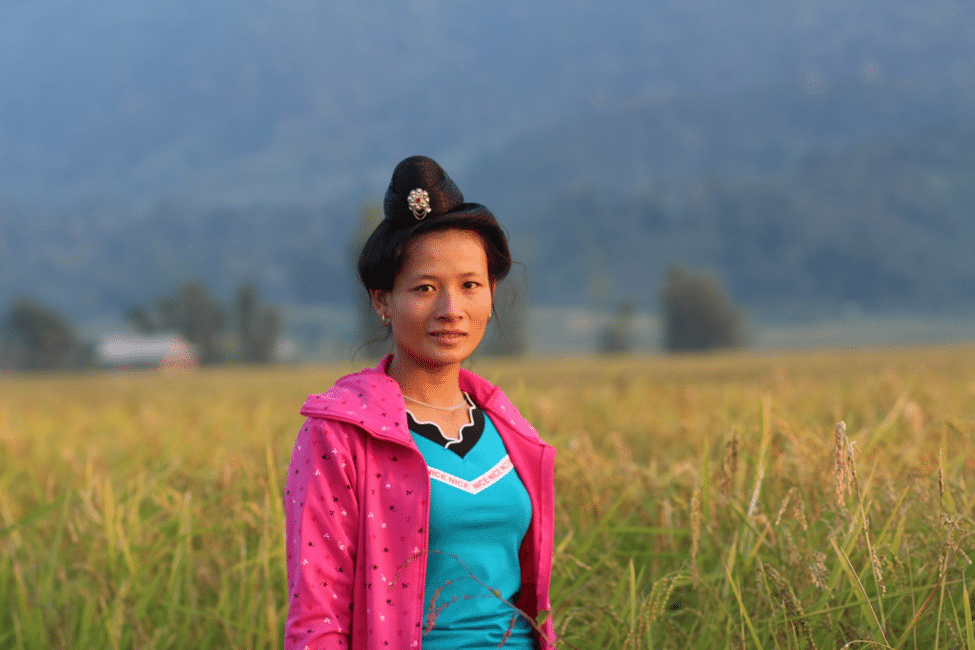From Benefiting to Sharing Benefits
Duong’s story

Lo Thi Duong points at a big piece of paper on the wall, reading out loud the weather forecast information for the next three months. The forecast introduces both information provided by the provincial forecast agency and traditional experiences by local people. For every part of the paper, she repeats the information several times to make sure the rest of the room, about thirty other women, understand everything clearly. Meanwhile, the women confirmed their understanding with each other, using a mixture of both Thai and Vietnamese languages.
This is one of the regular meetings of Phang village’s saving group in the mountainous province Dien Bien in northern Vietnam. Comprised of 32 women, all of Thai ethnicity, the group meets twice a month to put money together in a pooled fund where they can either borrow or keep their savings. The second part of each meeting is for members to learn about the weather forecast and advice for farming, including what kind of fertilizers and how much should be used, how to prepare seedlings, and when to drain water out of the field. For a traditional rice farming area, such as Dien Bien, one would not expect such knowledge to be difficult to obtain. In reality, fast changes to the climate, combined with the misuse of pesticides, have made it more and more challenging for local farmers to depend on the conventional experiences passed down on to them from generation to generation.”I used to not even know who in the local authority to ask for advice if I wanted to know what herbicides or pesticides I should buy.”
That is a fact that Mrs. Tran Thi Thanh Xuan, one of Dien Bien District’s agriculture public employees, acknowledged when, in 2015, CARE started a project in two communes of Dien Bien District to provide agro-climate information to local farmers. Now Xuan’s mobile phone number is listed in every weather bulletin and she frequently joins group meetings like this to respond to any questions from the local women farmers regarding rice farming techniques.
Over 70 percent of the population of Vietnam live in rural areas where agricultural technology is still lagging far behind many other sectors in the economy. In Dien Bien District, where CARE’s project, Agro-Climate Information Services for Women and Ethnic Minority Farmers in South-East Asia (ACIS), is implemented, two-thirds of the population are Thai, rice farming is the main source of income for many poor families, and women are the major labour force.
However, many women have little access to village meetings where information about farming techniques are presented. Many of the women are also not able to read and write Vietnamese, the official language in all weather forecasts from the television and radio. In addition, the forecast and farming advice are more general at the provincial level, while each district in Dien Bien province might have very different characteristics, making it difficult for farmers like Duong to apply the information she receives to her field.
Since joining ACIS in late 2016, Duong has attended various workshops where she has learned the meaning of each seasonal weather forecast and how to apply the advice in farming technique bulletins. More importantly, Duong and other farmers have contributed to the creation of such bulletins by adding their local knowledge and experiences.
Now that Duong can understand and use the bulletins better, she has seen a sharp increase in her family’s rice yield. Moreover, she has saved a lot of money from buying fertilizers and pesticides because she no longer buys general types of materials to use randomly.
Duong’s family is not the only one benefiting from applying weather forecast and farming advisories provided by the ACIS project. After becoming more confident with her own knowledge and skills, Duong started to instruct other members to apply forecast information and farming techniques. In the beginning, not all families were open to trying new methods to their rice fields. But Duong’s efforts have started to pay off: two years after of joining the ACIS project, many people have started to see positive changes. In the past crop season, in comparison to other groups of families that do not participate in the project, the families that participate in the project had the biggest increase in their rice yield while significantly reducing the use of fertilizers and herbicides/pesticides.
